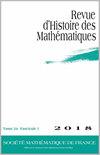法占领区的奥伯沃尔法赫:1945年至1950年代初
IF 0.2
4区 哲学
Q4 HISTORY & PHILOSOPHY OF SCIENCE
引用次数: 2
摘要
这篇论文是一个更大的研究项目的一部分,该项目涉及奥伯沃尔法赫数学研究所从1944年成立到20世纪60年代初的历史。虽然人们对其建立的历史相对了解得很清楚,但(数学)历史学家几乎没有触及该研究所1945年之后的发展。第二次世界大战后,该研究所面临着双重挑战。一方面,它必须彻底改造自己,即剥离与战争有关的数学研究议程,并找到适合战后形势的新身份。另一方面,研究所没有预算,因为它完全依赖柏林的资金,随着战争的结束,柏林的资金永久停止了流动。为了理解该研究所及其所长Wilhelm s本文章由计算机程序翻译,如有差异,请以英文原文为准。
Oberwolfach in the French occupation zone : 1945 to early 1950s
— This paper is part of a larger research project dealing with the history of the Oberwolfach Research Institute for Mathematics between its foundation in 1944 and the early 1960s. While the history of its foundation is relatively well understood, the development of the institute after 1945 has scarcely been touched on by historians (of mathematics). After World War II the challenge faced by the institute was twofold. On the one hand, it had to virtually reinvent itself, i.e. to strip itself of the agenda of war-related mathematical research and find a new identity suited for the post-war situation. On the other hand, the institute was without a budget as it had completely relied on funds from Berlin, which permanently stopped flowing with the end of the war. To understand how the institute and its director, Wilhelm Süss, dealt with this twofold challenge, the consequences of the institute coincidentally being situated in the French occupation zone, and the potential implications of this political happenstance for the history of mathematics in post-war Germany, will be centre-stage in what follows. The history of the Oberwolfach Institute in the late 1940s and early 1950s cannot be understood without embedding it into the political and cultural context of the French occupation zone, which had a long-term impact on its institutional identity. Co-operation with French mathematicians and with Texte reçu le 10 février 2020, accepté le 27 mai 2020, révisé le 24 juillet 2020. V. R. Remmert, Interdisziplinäres Zentrum für Wissenschaftsund Technikforschung (www.izwt.de), Bergische Universität Wuppertal, Gaussstrasse 20, D42097 Wuppertal. Courrier électronique : remmert@uni-wuppertal.de 2000 Mathematics Subject Classification : 01A60, 01A74, 01A80.
求助全文
通过发布文献求助,成功后即可免费获取论文全文。
去求助
来源期刊

Revue D Histoire Des Mathematiques
HISTORY & PHILOSOPHY OF SCIENCE-
自引率
0.00%
发文量
0
审稿时长
>12 weeks
期刊介绍:
Published by the French Mathematical Society, the Revue d’histoire des mathématiques welcomes original research papers (in French or English) on the history of the mathematical sciences, from Antiquity to the contemporary world. Mathematical sciences may be studied from the point of view of their own development or that of their relation to other fields or to their cultural, social or institutional environment. The Revue d’histoire des mathématiques also serves the international community of historians of mathematics by offering room for critical debates, historiographical surveys, programmatical notes as well as editions of hitherto unpublished documents with commentary. Over and beyond this community, it may be of interest to mathematicians, historians and philosophers of science, sociologists, anthropologists and, more generally, to anyone looking for a reflection on mathematics and its development.
 求助内容:
求助内容: 应助结果提醒方式:
应助结果提醒方式:


